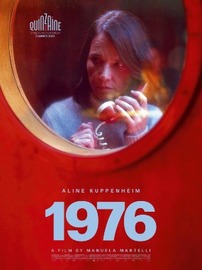Film Review: Chile 76: The Aftermath of a Broken Mirror
by John Kendall Hawkins
"It is possible they will smash us, but tomorrow belongs to the people, the workers. Humanity advances toward the conquest of a better life."
- Salvador Allende, from Last Words Transmitted by Radio Magallanes, September 11, 1973
Recently, I watched Coup 53, the 2019 documentary directed by Taghi Amirani, which depicts the story of Operation Ajax, the CIA/MI6 staged coup in Iran that overthrew the government of democratically-elected Prime Minister Mohammad Mossadegh. The 1953 coup was a joint operation between the United States and the United Kingdom, which aimed to remove Prime Minister Mohammad Mosaddegh from power and restore Mohammad Reza Shah Pahlavi as Iran's leader. The CIA played a leading role in this covert operation, which involved using CIA-funded agents to foment unrest inside Iran by way of the harassment of religious and political leaders and a media disinformation campaign. When such machinations failed, the US government, under Eisenhower, resorted to planning out a military coup, codenamed Operation Ajax, counterintuitively named after the popular cleansing detergent, and not the mythological figure, according to historian Hugh Wildord in his book America's Great Game, page 164.
The Eisenhower administration, noting "how easy" to execute the coup was, went on a spree from 53, cleansing Arbenz in Guatemala in 1954, Lumumba from Congo in 1960, Trujillo in Dominican Republic in 1961, the attempt to coup Castro at the Bay of Pigs in 1961, Diem in South Vietnam in 1963. Goulart in Brazil in 1964, Sukarno in Indonesia in 1967, and Allende in Chile in 1973. And it didn't stop there. The Mighty Whitey on his high horse was cleansing the world, "stronger than dirt," as the 1965 TV commercial cheekily suggests. The Monroe Doctrine was alive and well.
The British government has always denied their role in the overthrow in Iran, but Coup 53, by means of the redacted then recovered testimony of MI6 operative Norman Darbyshire (re-enacted by Ralph Fiennes) tells a different story. The value of the recovered interview makes Coup 53 a far more compelling documentary and sings the value of declassifying primary documents that give the lie to official narratives from politicians delivered to the public by complicit journalists. The redacted Darbyshire material is now available online at the NSA Archives. It is also a reminder of the value of journalists like Julian Assange, who provided, at great risk to themselves, public access to unredacted documents that aired the dirty laundry of Empire's White Knight.
More recently, I watched Chile 76, a 2022 film that sees a young Pinochet resistance fighter on the lam who, with a priest's assistance, comes under the care of a comfortably numb middle class woman in the aftermath of the Allende Coup. Directed by Manuela Martelli, and starring Aline Kuppenheim (Carmen), Nicola's Sepúlveda (Elas), and Hugo Medina (Padre Sa'nchez), Chile 76 is an understated depiction of the aftermath of the 9/11 1973 Allende coup and the subtle, but creepy sense of surveillance all around in the Pinochet years. No, nothing says fist-f*ck like a Pinochet hand puppet up your democracy.
The film opens with a harbinger of the tensión ahead, when Carmen at a shop in Santiago, getting some paint mixed up that she'll use as part of her renovation of a seaside property she's to visit, is interrupted by a heard-but-not-seen act of violence in the street. A scream of protest, a fascist admonition ("b*tch!"), and a fast driveaway. There is some silence in the shop. They know what it means. Another desaparecido has been delivered to the punch-face factory for intellectual processing and complicity-extrusion. A shoe is left behind in the street. Carmen has a touch of blue on her own shoe.
At her summer house Carmen is visited by Padre Sa'nchez who essentially begs her to look after Elas, a "common criminal" who is hiding from the Pinochet Machine. He has been shot in the leg and can't immediately flit about in the shadows of the underground's network of safe houses until he heals sufficiently. Carmen doesn't reveal her name to the young man, for fear that, if captured by the regime, he will be forced to give up her name and endanger her. Tension builds. People talk. Dissent, however mild-seeming, is removed.
The film gives the lie to the US-endorsed notion that things got better in Chile after the socialist Allende was couped. Nobody summed up the foreign policy mission of the US intelligence community back in the 80s better than the former director of the CIA's Counterterrorist Center. Clarridge had set up the 1984 mining of Nicaraguan harbors, an act for which the United States was convicted in a 1986 World Court case at the Hague. He was unapologetic. Clarridge praised Pinochet, while further denigrating Allende's memory by referring to him as "what's-his-name." In an interview with John Pilger he praised the CIA's involvement in the 1973 coup.
Clarridge, in his later years, disgusted at what he perceived as a backsliding from the lessons of Triumph of the Will at the post-Church hearing Agency, started up his own CIA and recruited hombres to beat the snot out of nonsense in the world. He was "doing it" in Afghanistan before illness forced him to return to his home in San Diego to die.
Lest we are tempted to save face by describing the ravings of Duane Clarridge as outlier stuff and beyond the coping mechanisms of more rational humans, we need only look to the inspiration for his madness in the cool calculations of the Nobel Prize-winning criminal Henry Kissinger. It was Kissinger who uttered his notorious proclamation that summed up his view of democracy -- any democracy:
(Note: You can view every article as one long page if you sign up as an Advocate Member, or higher).





